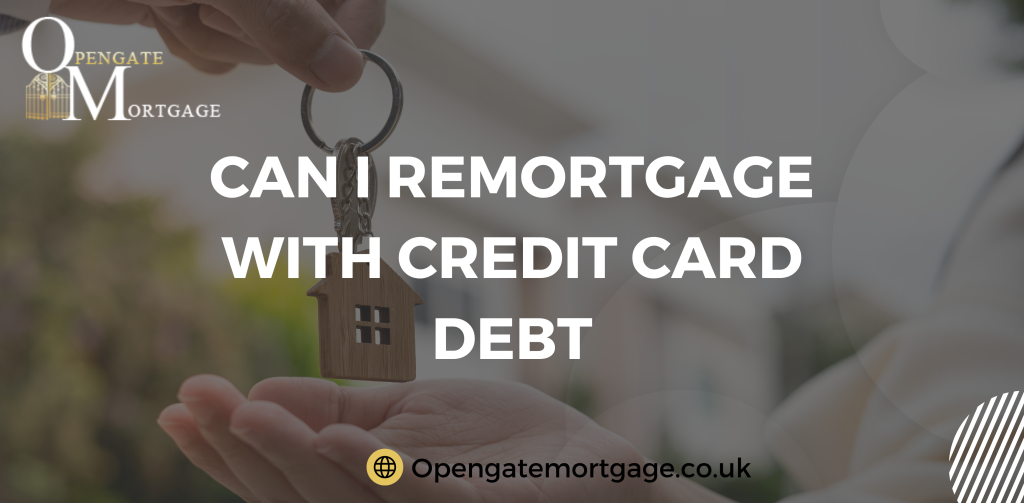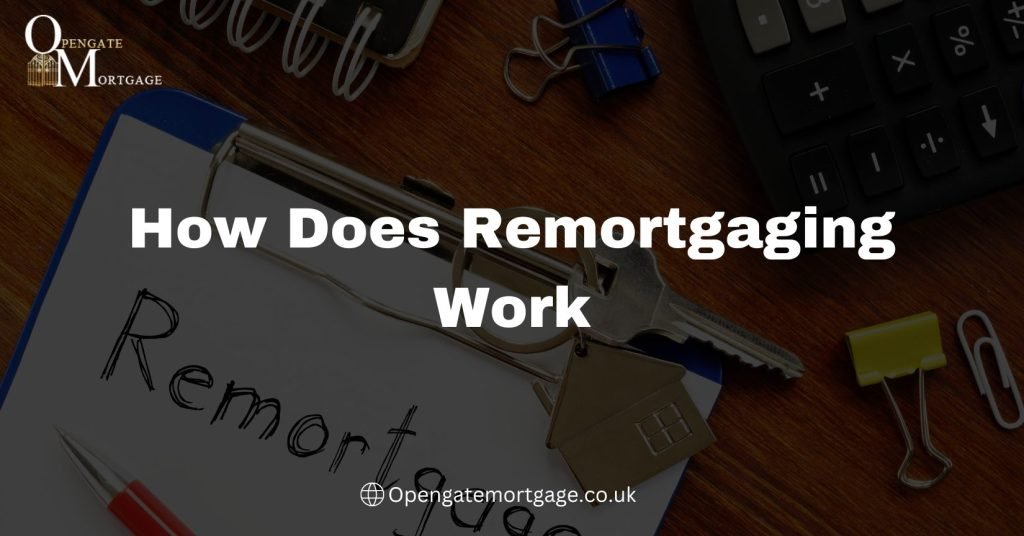As a homeowner, you may be considering remortgaging your property to take advantage of lower interest rates or tap into your home equity. However, if you have significant credit card debt, you may wonder Can I remortgage with credit card debt. The good news is that having credit card debt does not necessarily preclude you from remortgaging, but your options and terms may be more limited.
By understanding how lenders view credit card debt and taking steps to improve your credit profile, you can position yourself to remortgage, pay off higher-interest debts, and save money in the long run. With some strategic planning, remortgaging could help turn your financial situation around.

Understanding Your Credit Card Debt
To determine if a remortgage is feasible with existing credit card debt, you must first understand the specifics of your debt situation.
- Evaluate how much you owe on each credit card and the interest rates charged. Credit card debt often has high-interest rates, typically over 15% APR, which means balances can grow quickly if only making minimum payments.
- Calculate your total credit card debt by adding up the balances on all cards. Also, determine your minimum monthly payments for each card. This gives you the full scope of what you owe each month before even touching the principal balances.
- Check your credit utilization ratio, which is your total credit card balances divided by your total credit limits. A ratio over 30% can hurt your credit score and make remortgaging difficult. You may need to pay down balances before remortgaging is approved.
- Review your budget to see how much you can afford to pay towards your credit card debt each month. Then make a debt payoff plan, either paying off high-interest debts first or paying off the smallest balances first. Stick to your plan each month to make progress.
- Check your credit score and credit report to ensure there are no errors before applying for a remortgage. Take action to dispute any errors with the credit bureaus to improve your score. A higher score means a better chance of approval and a lower interest rate.
By understanding the specifics of your situation, you can determine the best path forward to pay off credit card debt and potentially qualify for a remortgage. With time and dedication, you can eliminate debt and achieve financial freedom.
Does Credit Card Debt Affect Your Ability to Remortgage?
Your credit card debt can negatively impact your ability to remortgage. Lenders view high levels of unsecured debt as a risk, as it indicates you may struggle to repay a new mortgage. However, remortgaging with credit card debt is still possible if you take the right steps.
To improve your chances of remortgaging approval despite credit card debt:
- Pay down your balances. Make extra payments to lower your credit utilization ratio, which is your total debt balance divided by your credit limit. A lower ratio, ideally 30% or less, shows you’re using credit responsibly.
- Check your credit score. Order a free credit report to check for any errors before applying for a remortgage. Take action to improve your score, e.g. paying bills on time and limiting new applications. A higher score means better mortgage terms.
- Provide evidence of on-time payments. Gather records showing you’ve made at least 6-12 months of on-time minimum payments. This demonstrates your ability and willingness to repay debt.
- Apply for preapproval. Getting pre-approved for a mortgage shows lenders you’re serious. It also gives you an estimate of how much you can borrow so you can determine if it’s enough to pay off credit cards after closing.
- Consider debt consolidation. If interest rates on your credit cards are high, you may benefit from consolidating balances onto a lower-rate personal loan. This can simplify payments and save money that you can put toward mortgage costs.
While credit card debt adds complexity, many homeowners in similar situations are still able to remortgage their property. With prudent financial management and the right approach, you can overcome this obstacle and secure a new mortgage that suits your needs.
Steps to Improve Your Chances of Getting Approved
To improve your chances of getting approved for a remortgage when you have credit card debt, there are several steps you can take:

Reduce Your Credit Card Balances
Pay down as much of your credit card debt as possible before applying for a remortgage. Lower balances will improve your credit utilization ratio, which makes up 30% of your credit score. Aim for balances below 30% of your credit limits on each card. If needed, you may want to temporarily stop using credit cards to pay for discretionary items in order to pay more towards your balances each month.
Check Your Credit Report for Errors
Order a free copy of your credit report and check it carefully for any errors. Dispute significant errors with the credit bureaus to get them corrected, which can help raise your score. Even small errors should be addressed to ensure your credit report is entirely accurate before applying for a mortgage.
Do Not Apply for New Credit
Avoid applying for any new credit cards or loans in the months leading up to your mortgage application. New credit inquiries can lower your score by a few points and raise red flags for lenders. Only apply for new credit when absolutely necessary during this time period.
Consider a Debt Consolidation Loan
If your high-interest credit card debt is a major concern, consider consolidating it into a lower-interest personal loan. Make sure the loan has a fixed interest rate, and that you can pay it off within 3 to 5 years. Paying off credit cards with a consolidation loan may improve your credit utilization ratio and debt-to-income ratio, which many mortgage lenders consider. However, the new loan will also appear on your credit reports and may slightly lower your score at first. So, only consolidate debt if the interest savings outweigh the potential drop in score.
By following these steps in the months leading up to your mortgage application, you can improve your chances of approval even with existing credit card debt. Reducing balances, checking for errors, limiting new applications, and possibly consolidating high-interest debt are all strategies that may help strengthen your case. With time and effort, you can build a solid financial profile to qualify for a remortgage.
Alternative Options if Remortgage Is Denied
If your remortgage application is denied due to high credit card debt, you have other options to consider before your mortgage deal ends.
Debt Consolidation Loan
A debt consolidation loan allows you to pay off your high-interest debts like credit cards by taking out a lower-interest personal loan. You then make fixed monthly payments to pay off the consolidation loan. This can help simplify payments, reduce interest charges, and improve your credit utilization ratio. Shop around at different banks and credit unions for the best rates.
Credit Counseling
Non-profit credit counselling agencies can help you create a tailored debt payoff plan. They will negotiate with your creditors to lower interest rates and payments. You then make one lower payment to the agency each month, and they distribute it to your creditors. This can help make paying off debt more affordable and sustainable. Fees for these services are often very low or free.
Balance Transfer
If you have a good credit score, you may be able to transfer your high-interest credit card balances to a lower-interest card. Look for a card offering an intro 0% APR balance transfer promotion. Pay off as much of the balance as possible during the intro period before interest charges resume. Be aware of any balance transfer fees, and make sure to stop using high-interest cards to avoid racking up more debt.
Spending Cuts
The more you can reduce your spending and pay extra each month towards your credit card debt, the faster you can pay it off and improve your chances of remortgaging. Look for expenses you can trim like dining out, entertainment, and hobbies. Put any extra money from lower spending, salary increases or bonuses directly towards your credit card balances each month. Pay off high-interest debts first to avoid costly finance charges. With time and discipline, you can eliminate your credit card debt and become eligible to remortgage.
Conclusion
As you have seen, remortgage with credit card debt is possible, but it does come with some challenges. The key is to take action and make a plan to pay off your high-interest debts so you can qualify for a remortgage and benefit from lower interest rates. Meet with a financial advisor to review your budget, cut unnecessary expenses, and set a realistic payoff schedule for your credit cards.
Once you have made progress paying them down and your credit score has improved, you’ll be in a much better position to remortgage, save money each month, and achieve greater financial freedom and stability. With discipline and perseverance, you can overcome your debt and remortgage successfully. The rewards of lower interest rates and payments will make all your effort worthwhile.
FAQs about Can I remortgage with credit card debt
Q: Can I remortgage if I have credit card debt?
A: It is possible to remortgage if you have credit card debt. However, it depends on various factors such as your credit score, income, equity in your property, and the policies of mortgage lenders. Lenders will assess your overall financial situation and debt-to-income ratio before approving a remortgage application.
Q: What are the benefits of remortgaging to pay off credit card debt?
A: The benefits of remortgaging to pay off credit card debt include potentially lower interest rates, a single monthly payment, and the ability to stretch repayment over a longer period. It can provide financial relief, reduce monthly obligations, and help improve cash flow.
Q: Are there any risks or drawbacks to remortgaging with credit card debt?
A: Remortgaging with credit card debt may come with risks. By transferring unsecured debt to your mortgage, you are essentially converting it into secured debt. If you default on mortgage payments, you could risk losing your home. Additionally, extending the repayment period may result in paying more interest over time.
Q: How do mortgage lenders view credit card debt when considering a remortgage?
A: Mortgage lenders assess credit card debt as part of your overall financial situation. They consider your credit score, debt-to-income ratio, and ability to repay the mortgage. Higher levels of credit card debt may affect your borrowing capacity and the interest rate offered by lenders.
Q: Can remortgage with credit card debt improve my credit score?
A: Remortgaging with credit card debt may not directly improve your credit score. However, by consolidating and paying off high-interest credit card debt, you can reduce your credit utilization ratio, which is a factor in determining your credit score. Responsible management of your remortgage and other debts can positively impact your credit score over time.
.



